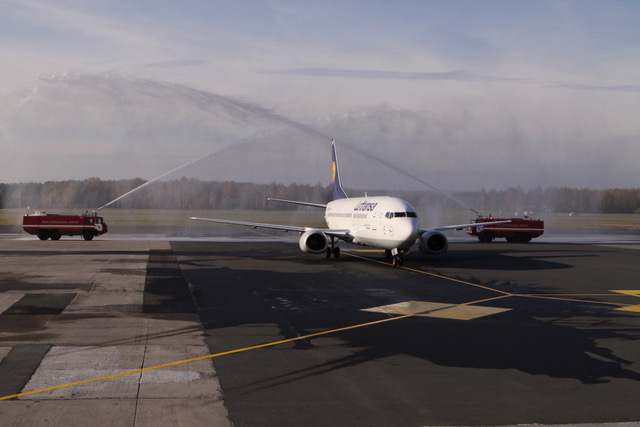Welcome aboard: In a both politically symbolic and practically important step, Lufthansa resumed flying from its main hub in Frankfurt to Rīga in October 1991. It was a debut flight full of joy and champagne, but with some weather turbulence and a politically delicate menu on board.
It was Lufthansa’s first scheduled flight to Rīga after Latvia had regained its independence. On 27 October 1991 the German airline resumed regular operations in the Baltics with the first plane from Frankfurt touching down on the runway of Rīga airport.
“The flight was something you will never forget,” remembers Aija Ebden. Together with her son Neil the Latvian exile was one of the passengers on board the Boeing 737 when Lufthansa re-inaugurated its Frankfurt-Rīga route following the collapse of the Soviet Union.
It was a major event – both for Latvia and the airline that became the second foreign carrier to offer flights from Rīga. Lufthansa had previously announced in September that it was expanding its flight connection to Eastern Europe and would offer three flights per week to Rīga and Kyiv.
With the inclusion of both cities in its 1991/92-winter flight plan, the German airline responded quickly to the latest political developments.
“I heard the announcement when watching the evening news on German TV. That was a big and positive surprise for me as a Latvian. We were very happy about this news and passed it on here and there, but we did not know any more concrete details,” recalls the now 83 years old Ebden, who at the time was living and working in Münster, in an interview with LSM.
Known as ‘Minstere’ in Latvian, the city in Westphalia was back then a kind of Latvian capital in the free world for the Latvians in exile during the Soviet occupation. It is best remembered as the site of the legendary Latvian Gymnasium (Minsteres latviešu ģimnāzija), where exile youth from around the world studied language, culture and other subjects during the Soviet occupation of their homeland.
Ebden attended the school and graduated from it in 1960. Münster was also home to the still existing Latviešu Centrs (Latvian Center) and hosted both the Latvian Central Committee in Germany (now: Latvian Community in Germany) and an information office of the World Federation of Free Latvians.
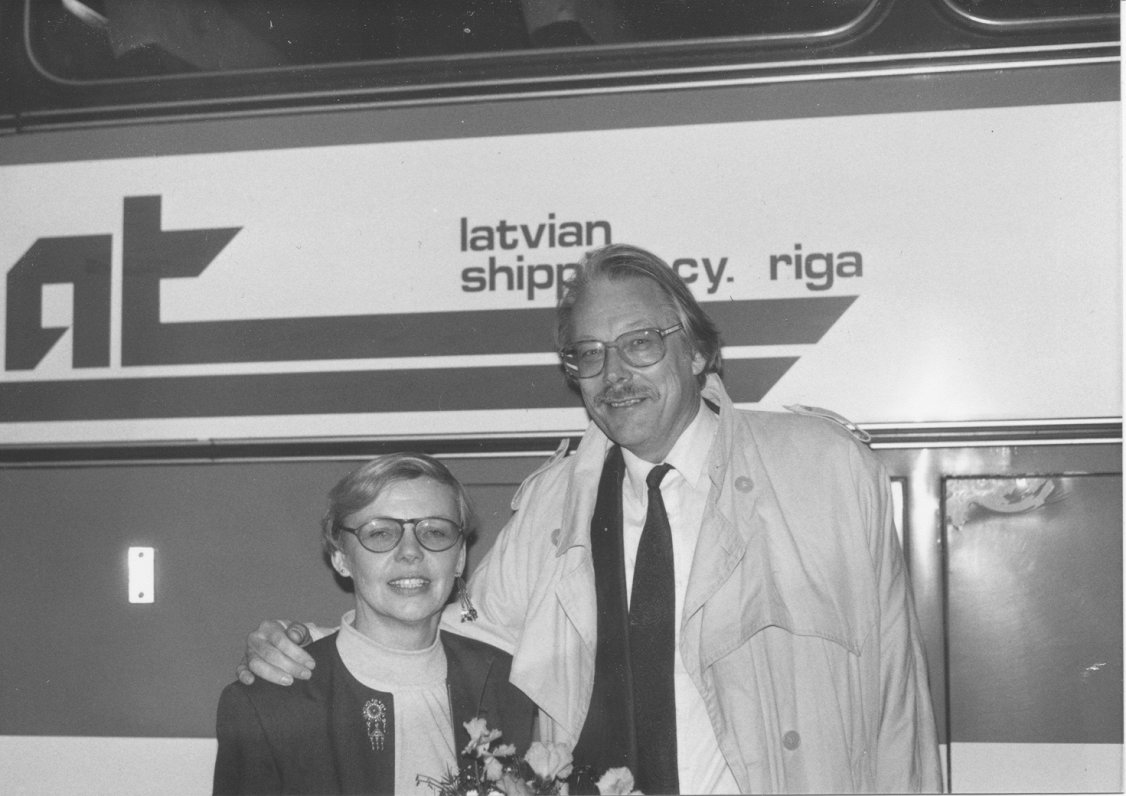
Aija Ebden und Andris Kadeģis, chairman of the Latvian Central Commitee in Germany (now: Latvian Community in Germany) are standing in front of a bus that brought the guests of honour from the airport to the Small Guild in Riga
Photo: Neil Ebden personal archive
“We sat down in Münster together with the then chairman of the Latvian Central Committee, Dr. Andris Kadeģis, and wrote a letter of congratulations to Lufthansa, telling them that we were happy that Lufthansa and Germany were bringing us closer to our homeland,” Ebden remembered during an interview with LSM in her home in Rīga, adding that she also immediately called her son Neil, who at the time was (and still is) working at Lufthansa but at first he did not have any more information on hand than what was said on television.
“He said he had to check it out. Lufthansa is a big airline and has many destinations.”
First destination in the Baltics
Rīga back then was the first capital in the Baltics that Lufthansa chose for its expansion to Eastern Europe in the 1990s. Initially, the airline flew three times a week non-stop from Frankfurt to the Latvian capital and then via St. Petersburg back to Germany. Flight LH1380 was regularly taking off from Germany’s main international airport on Tuesdays, Fridays and Sundays at 10:50 and landed after almost two and a half hours at 14:10 in Rīga, while the return flight left Rīga at 18:55 and arrived in Frankfurt at 20:20.
Flying then still was an adventure and exclusive since low-cost concepts had not been invented. The price for a round trip ranged from 2 750 Deutsche Mark in the First Class to 1 140 Deutsche Mark in Economy Class, while cheaper tickets were available for young people and special economy flight tariffs. Converted into the EU common currency this would be around 1 400 Euro and 570 Euro today, based on the fixed conversation rate without taking into account inflation effects.
These fares did, of course, not apply for the guest of honour passengers on the debut flight – they were welcomed on board for free. In return for her letter of congratulations, Ebden received an official answer from Lufthansa stating that Kadeģis and she were invited to board the airline’s maiden flight to Rīga on 27 October 1991.
“I was overwhelmed when I received this letter saying ‘We would like you to be our guest’ and that everything would be arranged for us. I could not believe what I was reading,” she told LSM, clearly still excited about it.
While nowadays Internet and mobile phones have made booking and arranging flights so easy, back then there were still paper tickets that were handed over well in advance in person by a travel agent.
“We were supposed to go to the Lufthansa representative office in Münster to pick up our flight tickets,” Ebden recalls of the instructions in the Lufthansa letter. No sooner said than done – and just some days later she proudly was in possession of her flight ticket Rīga. Being among the approximately100 guests of honour on the maiden flight meant a lot to her.
Taking off
Ebden was looking forward to the flight with great anticipation – and was not to be disappointed.
“Dr. Kadeģis and I met at Münster Osnabrück Airport to fly from there to Frankfurt where we were supposed to be at 11 a.m. for a small celebration before departure. However, our plane was a bit late and then we suddenly found ourselves in the middle of the champagne atmosphere before departure of the plane that was fully booked by guests of honour and some other guests. What an event!” she fondly remembers her arrival in Frankfurt.
At the departure gate Ebden also met her son Neil who was able to join the flight as a Lufthansa employee. “He had to pay a certain fee for the ticket but it did not matter at all. We were very happy that we both were able to be part of this historic event,” Ebden said, indicating that it was something extra special to fly together with her son to Rīga, although both had already been before on the eve of the restoration of Latvia’s independence. “I got even one or two days off for it from my employer.”
Born in Pļaviņas in 1941, Ebden had to leave Latvia during the Second World War together with her grandparents, parents and two little sisters and arrived in devastated Germany at the beginning of the winter of 1944. There she grew up in four refugee camps, spending in total 16 years in Greven, Blomberg, Augustdorf and Münster. Later she worked for many years at the Westfälische Wilhems-Universität Münster (now: University of Münster) and held various positions in the Latvian Exile-community in Germany, in which also her son Neil was and is also active. He is currently heading Germany’s central Latvian organization – the Latviešu
Kopība Vācija (Latvian Community in Germany).
The Ebdens and other guests of honour were given a hearty welcome in Frankfurt to celebrate the special occasion that was about to be marked also with festivities in Rīga.
“Back then, Lufthansa still had some kind of special program for maiden flights,” Neil Ebden explains, adding that no expenses or efforts were spared in aviation in earlier times to honour and celebrate notable events.
“That was common practice back then when new routes were opened, but nowadays it is not done anymore, partly for cost reasons to save money.“
New era for Latvia and Europe
How significant the event was considered by Lufthansa became evident from the fact that even board member Adrian von Dörnberg joined the ranks of the numerous guest of honor that were welcomed personally by the captain and included representatives from politics, business and culture plus some members of the press.
Among the invitees was also Egils Levits, who spent a large part of his early life in Germany and gained his education there. Much later he would become Latvia`s head of state from 2019 to 2023. At that time he was an adviser to then Latvian foreign minister Jānis Jurkāns and about to become Latvia’s first ambassador to Germany after regained independence.
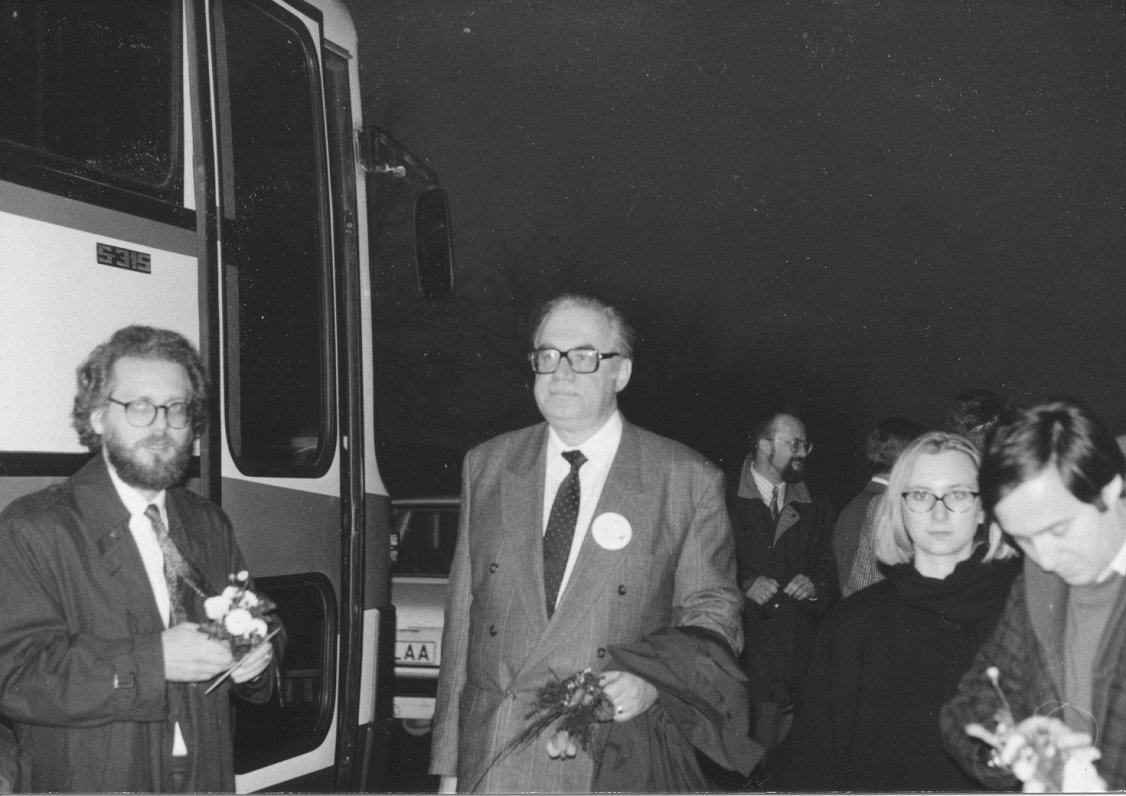
Egils Levits and Jānis Trapāns, head of the Latvian editorial office of Radio Free Europe/Radio Liberty in Munich, are standing in front of a bus that brought the guests of honour from the airport to the Small Guild in Riga
Photo: Neil Ebden personal archive
“I don’t have many personal memories of this flight,” Levits admitted to LSM, adding that he nevertheless is aware how politically relevant the opening of the Lufthansa route was at that time. “It was a symbolic re-establishment of the connection between Latvia and Europe. Moscow lost by that de facto control over Latvia’s external border. During the Soviet occupation, this border was hermetically sealed. But now it was open“, he said, recalling also that he spoke on the flight with Wolf Baron von Kleist (1922-2000), the then editor of the Baltic German periodical Baltische Briefe, about this “new historical era for Latvia and Europe that was about to begin.”
Hagen Graf Lambsdorff, Germany´s first ambassador to Latvia after the regained independence, echoes this political assessment. “It was, of course, a very important and highly meaningful step, so shortly after re-establishing diplomatic relations between Germany and Latvia,” the now 89 years old former envoy told LSM. He took office as the first permanent foreign ambassador in Rīga on 2 September 1991.
The Latvian daily newspaper Latvijas Jaunatne back then even wrote: “Lufthansa has recognized Latvia de facto“. However, for Lambsdorff and other members of the rather small international
community that used to live in Rīga, the opening of the Frankfurt-Rīga route had also a very practical meaning. “The new flight connection made many things easier. It provided us with a permanent connection to one of the largest European air hubs and from there basically to everywhere in the world,” said the former diplomat, whose official embassy office and residence back then was initially located in a room at the Hotel Rīdzene.
Improvisation was everything
Latvia was a quite a turbulent place back then and the times were challenging. The country had just regained its independence and was free again, but had to renew and rebuild its own state.
The joyful liberation from the Soviet regime was followed by an extremely difficult financial and economic situation that affected the setting up of the Lufthansa operation on the ground.
“The preparations for our regular airline service were quite extraordinary, ” is how Thomas Reichwein, who was in charge for the Lufthansa station worldwide, was quoted in the Lufthansa employees’ newsletter about the preparation for the maiden flight. “We only had six weeks to build from scratch a functioning Lufthansa station in the Latvian capital. “
The circumstances for the German airline’s team of experts that arrived in Rīga in mid-September were anything but easy: being cut off from the outside world without a satellite phone, catering not to be thought of at all, kerosene not available at all times, and local authorities and partners on site with unclear responsibilities and competences after the Aeroflot monopoly had ended.
Improvisation was everything – also because the airport was not able to provide anything more than an empty space for the Lufthansa office. All interior and equipment had thus to be carried in by plane from Frankfurt, as Reichwein described in detail. At least on the technical side there was some upwind. Lufthansa could use the plane maintenance equipment of SAS that was already on site at the airport in Rīga for a year since the first flight of the Scandinavian airline arrived in spring 1990. However, mechanics were initially still on board of each Lufthansa flight to Riga – and therefore also on the first flight.
Nasty surprise in the sky
Successfully overcoming many pitfalls on ground, Lufthansa still managed to make a faux pas in the sky – with its choice of the inflight meal. On the occasion of the first flight from Frankfurt to the capital of the newly re-independent Latvia, astonishingly the airline offered a ‘Russian inspired menu’, as could be read in the specially printed menu. It was an unpleasant surprise for the Ebdens and many other Latvians on board the Boeing 737 to Rīga tp be served Stroganoff and other Russian dishes – along with details of how to make them yourself on the menu.
“It is nice that the airline management understands the demographic situation in Latvia. After all, at least half of the people here speak and eat differently. However, I – and I think that compatriots from Latvia too – would have much rather tasted a real German Komm morgen wieder, as well as learned how to prepare it properly, ” the then head of the Latvian community in Germany, Andris Kadeģis (1933-2012), later told the Latvian weekend newspaper Sestdiena about the politically delicate menu with more than a degree of dry wit.
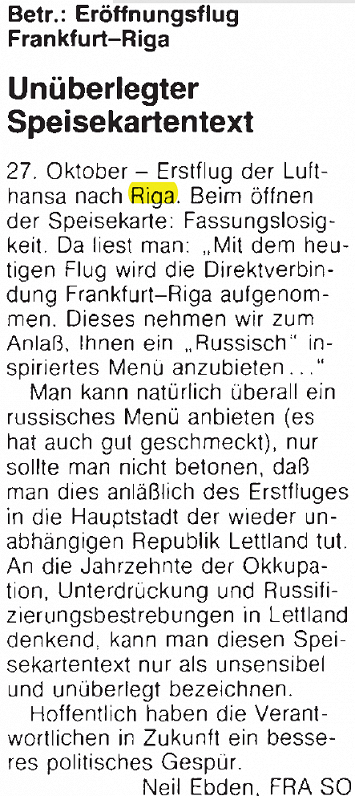
Neil Ebden’s letter about the menu
Photo: Neil Ebden
The Ebdens were also stunned. “It was completely unsuitable and did not fit at all, ” Aija Ebden states, when thinking back about the meal that was served, while her son Neil already back then was quick to react. He wrote to the Lufthansa employee magazine Lufthanseat, calling the inflight menu “insensitive and ill-considered”. “Hopefully those responsible will have a better political sense in the future, ” he concluded. To th airline’s credit his letter was published in the very same issue as reports about maiden flights to Rīga and Kyiv.
Stopover in Stockholm
It would have taken more than Stroganoff to spoil the mood of the passengers on the first flight, especially since drinks were served on board. This was not only because of the festive occasion, but also because the flight ended up lasting much longer than the scheduled 1 hour and 20 minutes.
“When were approaching Rīga, it turned out that we could not land because of heavy fog. So we first circled for about half an hour but it did not clear, and then the plane was diverted to Stockholm“, Neil Ebden remembers. “We landed without getting off the plane, the plane was refuelled and then we waited for better weather reports from Rīga airport.“
The passengers on the plane still found everything that happened interesting. “I heard some Lufthansa employees in the row behind us cheeringly saying ‘We can continue this even for longer since there is enough champagne on board’, ” Aija Ebden recalls of a conversation she overheard in the plane, when rounds of drinks were served during the unplanned stopover in Stockholm. “The atmosphere was really very, very champagne-filled in a positive sense.“
Once the weather conditions seemed to have improved, the pilot took off again and steered the aircraft towards Rīga to make another attempt to land. But the visibility was still limited and the plane had to circle for almost another hour over the Latvian capital that was “covered in a fog worthy of London“, as the daily Latvijas Jaunatne put it later.
Time passed quickly and it was already late afternoon. Unrest in the plane increased. “The first passengers began to lose hope that we will ever manage to arrive in Latvia on that day. However, after several circles, the pilot dared to prepare for landing and approached the runway, “ Neil Ebden said, adding that the weather challenged the pilot much more back then than it does today. He had visibility of only 200 to 300 meters when approaching the runway.
While nowadays navigation systems provide precision guidance to the pilot when approaching a runway and facilitate landings in low visibility conditions, in 1991 an Instrument landing system and other modern technical aids were not available at the outdated Rīga airport that used to operate as a local airport within the former USSR. The pilot nevertheless managed to put down the plane safely. “Suddenly the lights of an airplane appeared very close through the fog,” the Latvian paper Neatkarīgā Cinā described the landing. “Well, it could truly be said that the route had been opened.”
Welcome to Rīga
The first Lufthansa flight to Rīga for more than 50 years was completed after the route was discontinued in 1937 due to the political division of Europe. However, not everyone had the patience to wait until the symbolic moment. Except several journalists from Latvian newspapers and some other public figures there was hardly anyone left at the arrival gate to welcome the passengers of the historic flight that were about to be greeted by Latvian foreign minister Jānis Jurkāns.
“We arrived several hours late. The government delegation had disappeared and the welcoming ceremony was cancelled“, Neil Ebden recalls of the events after arrival at the airport – which was still firmly controlled by Soviet custom police officials.
“We were then quickly put on a bus without passport and visa control and swiftly taken to the Small Guild, where the second part of the ceremony was scheduled to take place.“
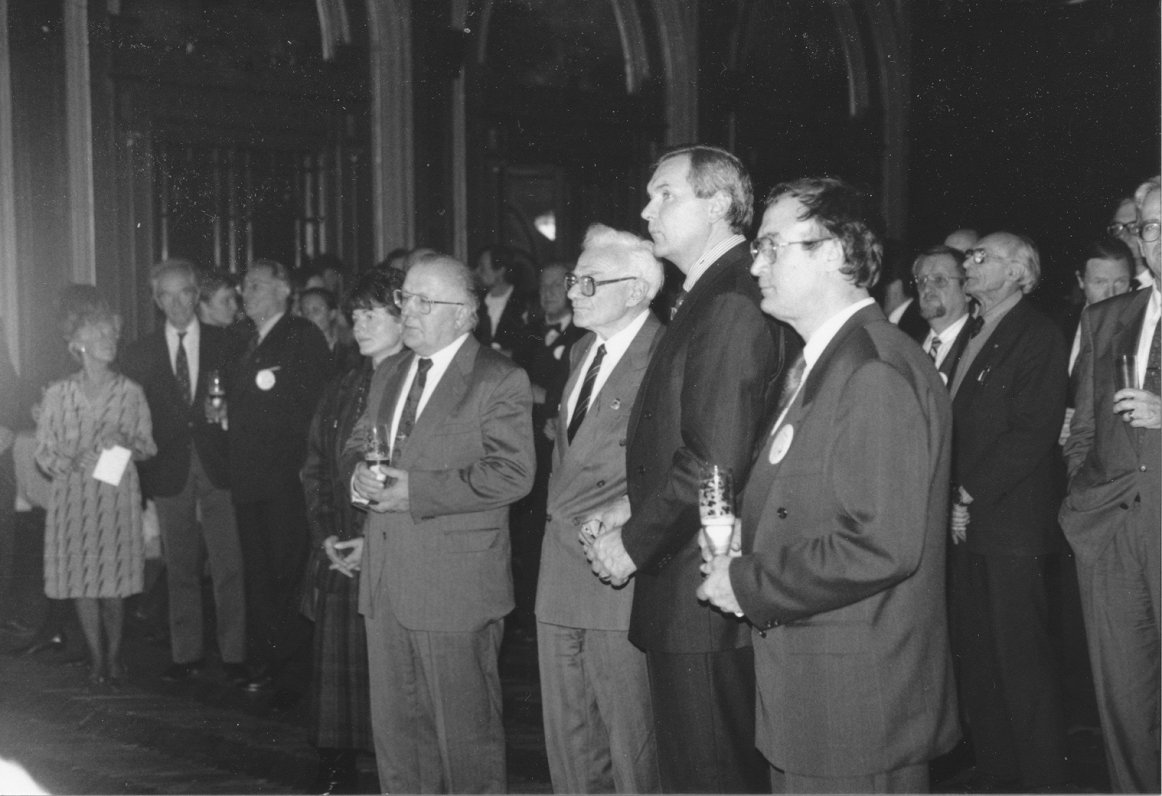
Latvian foreign minister Jānis Jurkāns (2nd from right) and Mavriks Vulfsons (3rd from right) are listening to the speeches together with Wolfgang von Stetten, chairman of the German Bundestag’s parliamentary group for contact with the Baltic states (right)
Photo: Neil Ebden personal archive
Being historically a meeting place of German master craftsmen in Hanseatic times, the Small Guild was a suitable location for the Lufthansa ceremony since the name of the airline is derived from the German word “Luft” meaning “air” and “Hansa” for the Hanseatic League.
“The reception was very elaborate”, Aija Ebden recalls, adding that every guest of honour on the plane was also able to invite some Latvian guests or friends that had some contact with Germany or spoke German.
“I invited three people. At first they did not understand at all when they received the invitation for this event in Rīga that Lufthansa was bringing to their house by car. ‘Why me?’, my guests told me. But it was really a big event, especially for those who had just shaken off the Soviet Union”, Ebden remembers of the mood that prevailed back then at the reception hosted by Lufthansa’s Rīga representative Hans-Joachim Barakling.
Lufthansa board member Adrian von Dörnberg emphasized in his speech that the airline was delighted to be able to contribute to the development of international relations of the Baltic States. “Old economic and private contacts will be re-established, new connections will be made. We are sure that the development can only be positive“, he said.
The guests were also addressed by the Deputy Chairman of the Council of Ministers, Ilmārs Bišers (1930-2011), who extended his wishes on the commencement of Lufthansa’s operations in Latvia.
While Aija and Neil Ebden could enjoy the evening together with other Latvian guests, as they had planned to stay in Rīga for a longer time and agreed with Lufthansa to fly back to Germany only some days later, for the other guests of honour the festive event was soon over. “They basically could stay there only about an hour. Then they had hurry to the buses that brought them back to the airport because they had to take the same plane back to Frankfurt. Most of them only managed to quickly eat some canapés and have a drink while listening to the speeches“, Neil Ebden remembers.
History repeating itself
But for Neil and his mother the climax was yet to come at the airport when they wanted to fly home from Rīga. “He had a bit of a discussion with the border guards. Because we did not have any entry stamps in our passports and they were wondering how we got in to the country. So we had to explain it “, Neil Ebden says, adding that it was very uncommon for that time that the arriving passengers had been put on the bus without any passport stamp.
Following some lengthy discussions, they managed to convince the officers behind the desk that all was fine as they have been part of the first Lufthansa flight .
“One of the border guards then asked his colleague, who was on duty that day. Luckily he could remember that there was such an event and then they let us leave again.”
Twenty years later Neil Ebden was again by chance on board of an anniversary flight. On 27 October 2011 he boarded the Lufthansa plane from Frankfurt to Rīga. “It was a regular flight and Lufthansa did not do anything about it. But Rīga Airport remembered the special occasion, and welcomed the plane with a water salute and each passenger with a box of Rīga candies and a specially prepared greeting card, ” Ebden said, who also wrote about the flight in the Latvian exile-newspaper Latvietis.
Though a nice gesture, it could not be compared his emotions during the maiden flight to Rīga that was a one-of-a-kind event for Neil Ebden in two respects: “Firstly because I had been an employee of Lufthansa and secondly because I am Latvian. That was definitely something special. No question about that.“
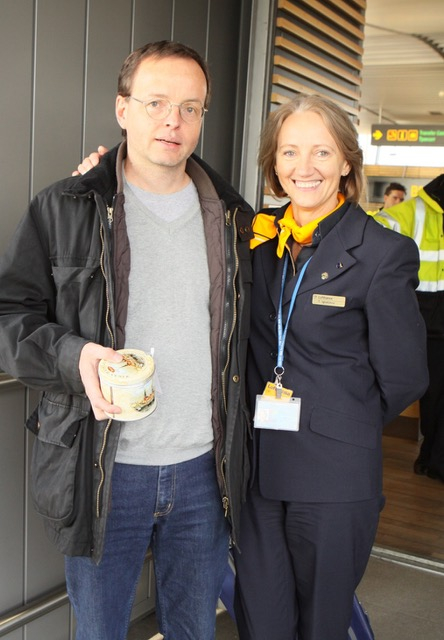
Neil Ebden and Lufthansa representative Tatjana Ignatjeva after the arrival of the 20 years anniversary flight in Riga
Photo: Neil Ebden personal archive
